Having already wrapped up her club football playing career, Dorianne Theuma will conclude the journey as a national team player this Friday. She will do so in front of a home crowd at the Centenary Stadium against one of Malta’s oldest foes, Bosnia & Herzegovina.
Synonymous with breaking records in goals, caps, and trophies, Dorianne Theuma’s name belongs to the upper echelons of Maltese football. However, talking with her for one last time as a player, perhaps truly revealed the person behind the records.
Meandering in between the curiosities of why Malta’s best ‘number ten’ played with the number six on her back, the proudest moments and the player she was most in sync with on the pitch, revealed a raw perspective into the highest highs and the lowest lows that football can bring.
The Final Season
Eleanor Saliba (ES): How early did you know that this would be your last season playing?
Dorianne Theuma (DT): I had been mulling over the question for two years. It was, and still is a tough one to take in and make peace with, as my life always revolved around football. However, this season was the first time in twenty-seven years of playing football where I noticed that my priorities had started to change. This was my first sign.
Apart from the mental factor, there was the physical one. This summer I had to undergo a knee operation. One thing which I was sure of was that I wanted to make a full recovery and return to the pitch. Although the operation was a success, the many years of playing caught up to me and my knee. Deep down I knew I did not get back to my usual self. As much as I wanted to give more, my body was telling me otherwise and naturally my motivation started to dip too. Overall, I am proud of myself for sticking out this season and ending things on my own accord.
ES: Was it gradual to come to terms with that decision or was it a straight-forward one?
DT: Well, it’s always a combination of things. However, as I look back, I think my target was always to perform well throughout the season with my club, so I could play with the national team and play against the best opponents. Being benched at national team level was a whole new situation for me. I was not used to it , but also was a sign that my time was coming to an end. I am grateful to the national team coach (Manuela Tesse) who has always respected me and kept me involved. However, there comes a point when you feel that it’s time to hang up your boots and pass on the reins.
ES: Domestically, it was a season where there was a lot of change and anticipation of higher competition. How do you compare it to other seasons?
DT: I think initially it was very competitive. It was the first season where almost everyone also recruited several foreign players, who contributed to lifting the level a bit as well. The start was not just between Swieqi United and Birkirkara, there was a real fight from Hibernians and Mgarr United. However, then by the end the same pattern evolved. On the other hand, the setup meant that the league was closed later rather than Birkirkara winning it two months in advance.
Closing The Chapter With The National Team
ES: There were big moments at national team level during the last year and it also marked the 20-year anniversary since the maiden match, something that you were a part of. What are your thoughts of those moments leading up to the promotion to League B and what was it like to experience it with players who have been around to see the national team get to that level?
DT: I think putting everything together, this year showed the growth. It’s true that compared to other countries we have been slower in that growth, but if you compare things to the start, you can see the change.
When I decided, I was going to retire, I brought out all my national team kits and found the first kit we ever had. It may be trivial, but the kit was huge, three people probably fit in my kit. These kits were the leftover ones from the men’s team at the time. Today, players have kits that properly fit them. Sitting on the bench within the national team, I looked at the coaching staff and realised how much these things evolved. Players who I used to play with have grown, some of whom were with me on the bench, even as part of the technical staff.
There’s satisfaction in knowing that I have been there throughout the entire story of the national team thus far. I remember going to Romania for our first match and can truly say that there have been huge changes. Now there are new players coming up, with an entirely different intensity and style of play, focusing on everything surrounding football including nutrition and so on. You learn a lot throughout all these years. At times, players my age are pegged as pessimists, but I can confidently say that we truly saw how bad it can be. However, I think you learn from everything, even maybe having a bad coach. I look at these things and make a note not to repeat the things which I did not like.
Dorianne Theuma will check out her stellar playing career in front of the home crowd at the Centenary Stadium this Friday, against Bosnia & Herzegovina. Having first met in 2003 in the debut year of Malta’s Women’s National Team, Dorianne Theuma is the only player to have played in all nine encounters between the two nations, from the two camps.
ES: Considering the history against Bosnia & Herzegovina, is it the perfect opponent to close out your playing career?
DT: As a season, I have no regrets because I truly gave everything, including ending up having to coach the team at club level. It would not have been my choice certainly, but the circumstances were what they were. As Dorianne the player, it was a sad way to end things. I did not expect to win the Knockout, but putting everything together, to have at least gotten to the final would have been nice. To concede a goal in extra-time and to have no control over the situation was tough to take.
However, thankfully coach Tesse has granted me the opportunity to be in the mix for the national team. I may not play a minute, that remains up to the coaches. As a player I remain determined to do my bit and contribute positively to the team. Whatever the case, the match against Bosnia & Herzegovina is extremely important for the team. Of course, the player in me dreams of going onto the pitch and making a key contribution. However, in the end, I am grateful for the fact that I get to close off my playing career with the national team.
ES: You have said in the past that you don’t really get anxious for matches. Will this be any different?
DT: Bosnia was one of the first teams we ever got drawn against, so there’s history. Of course there’s an emotional aspect, not particularly because it is Bosnia, but because it’s the national team. The anthem is the most poignant moment. Even sitting on the bench during the anthem is tough for me as compared to being in the line-up and even further considering that I captained the national team as well in the past. Things spiralled downward very quickly in the last few years in that regard at national team level. Despite this, I want to enjoy it.
It is a very important match and getting the maximum points are very important for the team. So, every moment that I am with the team building up toward the match I want to make myself available to give that positive push toward earning that result. In the end, the player in me still would like to maximise the time on the pitch because as a player I still want to play the game. However, I always strive to help the team in whichever capacity I can.
The Curiosities
ES: Why the number six?
DT: When I started with Hibernians, I was a thirteen-year-old playing in a squad with women who were thirty, thirty-five years old. I was also very shy. I am not kidding when I say that I probably spent the first four years barely saying a word, let alone requesting a specific number to play with. However, I was always an Inter fan. I remember there was a period when Youri Djorkaeff scored a bicycle-kick against Roma and following that our kit manager at the time, Victor Ellul, told me “today I’ll give you the number six for Djorkaeff” and I kept it from then on.
I got asked why I don’t play with the number 10 many times considering my playing position, but I stuck to the number 6. I played with the number 10 once with Mosta and I scored a hat-trick, but I still reverted back to the 6. Djorkaeff was a big idol for me. He was a central midfielder, played with France with (Zinedine) Zidane, so a big player and I stuck to it.
ES: What was the most memorable season?
DT: I think there are many memorable ones. Certainly, winning the first league title with Hibernians when I was just thirteen is memorable. However, I think the one that was most satisfying was winning the league with Mosta.
Around four of us went into Mosta, and as a club it was one of the oldest that had never won a title. There was a big rivalry against Hibernians and even Birkirkara at the time and we managed to win it in February so early as well. I don’t think we were the best team on paper, but we were united in our target and there was no pressure. So, it was not expected but most rewarding. We went on to win the Knockout and the Super Cup as well, so I would say that league title was something special.
ES: What was the toughest season?
DT: Probably, this year. I’ve had tough seasons, but this year I think everything bad that could happen, happened. I started by coming back from an operation which I had to work my way back from, the coach left mid-season and I had to take over coaching. On top of that I took over after the split, so only dealing with direct encounters against Hibernians, Mgarr United and Birkirkara. Considering the responsibility that I ended up having, I would say this was the toughest season. Having said this, I will take this all with a pinch of salt as I’m sure whatever happened this season will only help my future self.
ES: Is there a moment that sticks out in your career, a goal, a pass or maybe a particular battle?
DT: I would say the most memorable probably is scoring the free-kick against Latvia to qualify for the first time in 2013. There was plenty of people watching and I have some videos from a few mates of mine, which meant that despite the free-kick being from quite far out, they believed that I could score it. You appreciate those as you can hear their commentary willing you on to score it and then the euphoria that followed. I would say I scored nice goals, and also scored important goals in my career, but that one put both together. It was a beautiful goal and an important one.
ES: Who was the toughest opponent that you ever faced?
DT: I think the toughest opponents were of course at international level. Those matches show you the level that you need to reach. So, looking back, players like Fara Williams stick out perhaps, but in those matches I played a very different role to what I am used to playing locally as well. So, it’s difficult to pinpoint just one individual.
Indeed the 21-year journey with the national team has tossed up some world class opponents. So I asked Dorianne Theuma to identify the Best XI she’s ever played against, complete with a leading coach.
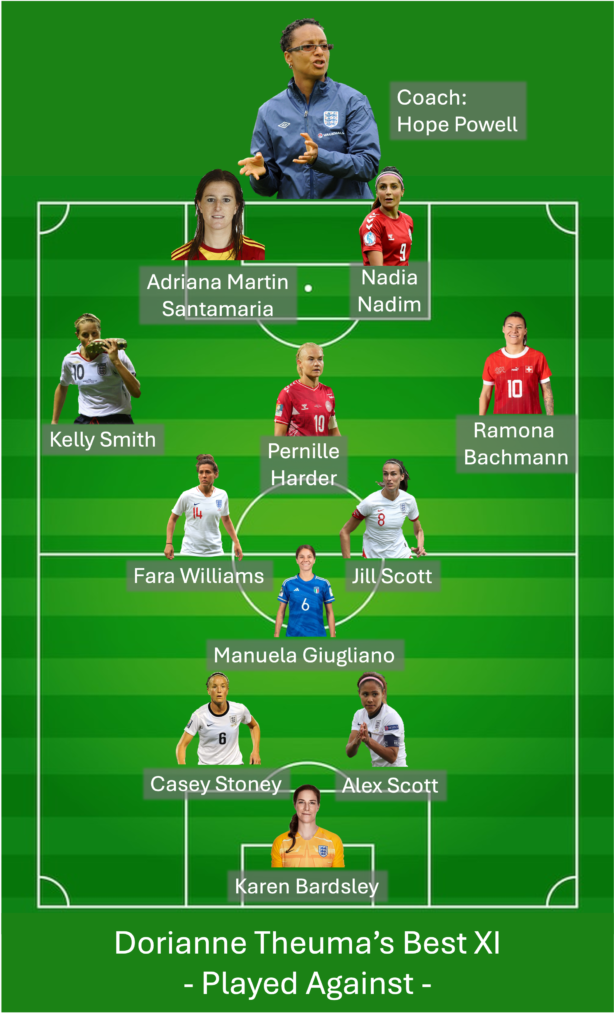
ES: Who is the teammate whom you felt you were completely in sync with mentally on the pitch?
DT: Rachel Cuschieri. We only played together at national team level, but I always felt she read exactly what I wanted to do and vice-versa. So, thanks to her I think I could really express my football. It is not easy to find this and you have to consider that we were playing together only at international level which is at an even higher intensity and competition. So, there was an even added satisfaction of getting that understanding and being able to enjoy playing my game thanks to her.
ES: If you had to start your playing career today, would you do anything differently?
DT: I think looking at things today I would probably take more care physically, since the game is more physical today. When I started there were no nutritionists or even physical trainers. If you gained a bit of weight, no one really cared. I went into the gym for the first time at 31 years old probably. Luckily, I was good technically and when I started that was all that mattered, but I had to evolve for sure.
ES: Is there something you feel is overlooked or underestimated about being a footballer in Malta?
DT: The commitment of female footballers. Most people do not realise that players do this voluntarily and do this with one-hundred percent commitment. This is why if a coach takes over a team thinking it will be easy money to coach a women’s team, these women will shut you out. Female footballers are going to training one hundred percent committed without earning a cent, so if they sense that someone is not truly committed to it, of course they will react. Unfortunately, that commitment shown by female players is overlooked.
ES: What is the one thing you will miss the most about being a player?
DT: Probably the adrenaline of winning, goals and celebrations. I work to win, I am a bad loser. As a coach I feel the same desire to win, but as a coach it is different. So, I think I will miss that rush that you feel as a player on the pitch the most.
ES: What is the one thing you will not miss about being a player?
DT: I will not miss the late training sessions. I had a few experiences and I did not enjoy them. As I said earlier, I learn from these things and as a coach I will make it a point to remove the things which I did not like. It’s not right for a player to be training at 8 or 8:30 pm, so I want to tackle it straight away. As a player I used to communicate these things with the coach and the committee. As a coach I will have more say and will work to avoid these things.
ES: What is the favourite venue that you have played in?
DT: Playing against Denmark away. The stadium was full and the atmosphere was incredible. Looking at the promotion and the setup for the supporters, I remember simply going into the stadium you were met with all of these stands for children, with merchandise. Everyone in red and white for Denmark. It’s the kind of atmosphere you see in most men’s matches, but for us going into the stadium, seeing people excited for your arrival was unique. Then of course walking onto the pitch, it was mesmerizing. It’s strange, to be losing, but still enjoying the match because it’s such a unique feeling.
ES: What was the lowest moment in your playing career?
DT: My lowest moment was getting stripped of the captaincy of the national team at 35 years old. Had I disrespected the captaincy, I would have understood, but at the time it felt like a punishment due to my performances dipping the period before. The reason I was given was that I was not fit to play a full game, but then in that season I played eight full games. Personally, even if the coaches believed I was too old to be fit enough to play a full match, there are many instances where a captain comes off from the bench and takes the armband, or leaves the game and passes on the armband.
It was tough to take, I was mentally destroyed. So tough that there was an upcoming friendly Visit Malta tournament, and it was the only time I refused to take part in the national team. Once I absorbed it, I took it as a challenge and ultimately proved my worth and ended up playing full matches. So, I think I proved that the real reason was not this. I could have easily folded at 36, but I knew I still had more to give and worked hard to play full matches for two more years.
Truth be told, in the end it’s not about the armband. It’s about being there for the players to listen to them, to understand what they are going through and fight for them. Being the captain without the band. That is something I always strived to do. I made enemies along the way, but deep down I always fought for what I believed in.
ES: What was the proudest moment in your playing career?
DT: Without a doubt, my greatest honour was captaining my country. I think that is something which was the pinnacle of what I strived to achieve in my career. It was the highest high I could reach, and I was immensely proud to have that responsibility on so many occasions. The feeling of representing your country is irreplaceable, let alone captaining the team.
Dorianne Theuma will wrap up her playing career tomorrow in the UEFA Women’s European Qualification match against Bosnia & Herzegovina, at the Centenary Stadium (19:30 CET). As Malta’s record goalscorer and appearance holder in the women’s game dons the Maltese shirt for one final time, while helping the team to attempt to down Bosnia & Herzegovina for a maiden victory in League B, this is one match which you surely do not want to miss. Tickets may be purchased online.
Lead Image: Joe Borg
Follow The Sporting Fan on social media: Instagram ~ Facebook ~ X
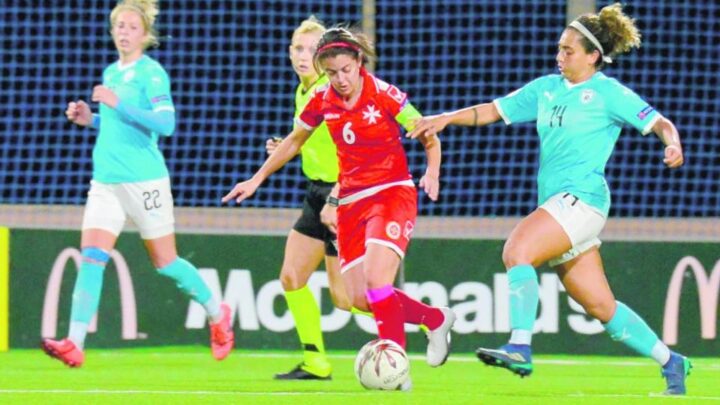
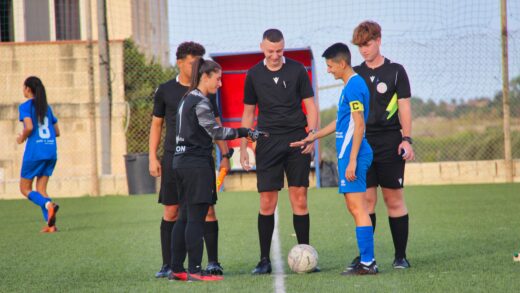
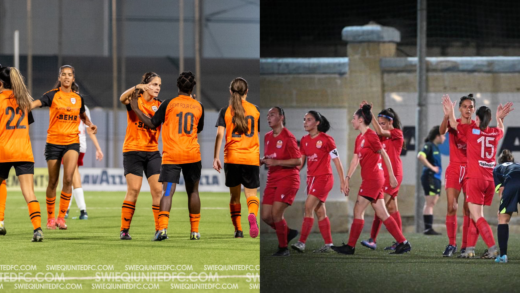
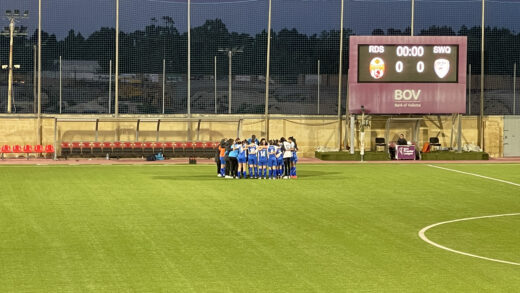
4 Responses
[…] taking over the head coaching duties of the women’s senior team after having recently put an end to her playing career. Mandy Debono will be taking the assistant coaching duties to Dorianne Theuma with the senior team. […]
[…] The match was preceded by a presentation to Maltese player Stephania Farrugia on reaching the 100th cap for Malta against Bosnia & Herzegovina. Having made her national team debut in 2007, Stephania Farrugia is just the second Maltese female football player to reach this feat, after the recently retired and current record appearance holder Dorianne Theuma. […]
[…] in her final appearance with the Malta Women’s National Team last May. She retired as the all-time top scorer and appearance record holder at national and domestic level. Theuma is now heading into her maiden season as the head coach of Swieqi United. Credit: Dorienne […]
[…] Meanwhile, Dorianne Theuma (Swieqi United) claimed the Best Coach of the Women’s League award in its introductory year. She was also awarded with the Merit Award in recognition for her outstanding football career in which she became the first Maltese female player to reach 100 caps for the national team, going on to make… […]